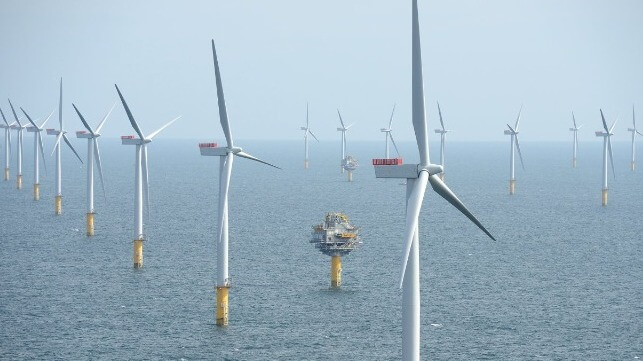Fourth Dogger Bank Wind Farm Section Could Power Hydrogen Production

With construction nearing completion on the first of three phases for the Dogger Bank offshore wind farm, partners Equinor and SSE Renewables report they are being to explore a fourth phase that might be used to power the production of hydrogen. SSE is leading the construction of the wind farm which is called the world’s largest and Equinor is scheduled to begin operations at Phase A in the summer of 2023.
The Dogger Bank Offshore Development Zone is located between approximately 75 and 180 miles
off the east coast of Yorkshire, extending over approximately 3,300 square miles and water depths range from 59 to 200 feet. The first of 95 turbine foundation monopiles Dogger Bank A was installed in July 2022, with the project due to start generating power in 2023 followed by the B phase in 2024. The project has been permitted for the first three phases each of which would produce approximately 1.2 GW of power.
Early scoping work is now underway to explore options for developing a fourth phase, Dogger Bank D. According to the partners, Dogger Bank D would be located in the eastern zone of the Dogger Bank C lease area, more than doubling the utilization of existing acreage. It would have the potential to provide an additional 1.32 GW of fixed-bottom offshore wind capacity but would require a new development consent order to progress into construction. The proposed development is located around 130 miles off the northeast coast of England and covers an area of 96 square miles.
The developers said they are exploring two options for the site. One would connect to the grid to provide power to homes while the other option being considered is the use of electricity produced by offshore wind to generate green hydrogen at a dedicated electrolysis facility in the Humber region. The facility, if developed, could become the UK’s largest green hydrogen project.
“Optimizing the Dogger Bank C lease area with an additional phase, Dogger Bank D, is in line with Equinor’s strategy to further develop offshore wind projects in clusters such as the North Sea,” said Halfdan Brustad, vice president of Dogger Bank at Equinor. “Both the grid offtake and green hydrogen production options from Dogger Bank D would contribute to the UK’s net zero ambitions.”
Equinor and SSE Thermal are currently collaborating to accelerate the decarbonization of the Humber, the UK’s largest and most carbon-intensive industrial region, through low-carbon projects such as Keadby 3 Carbon Capture Power Station, Keadby Hydrogen Power Station and Aldbrough Hydrogen Storage. As part of the Zero Carbon Humber initiative, hydrogen transmission, and storage infrastructure are planned in the Humber linked to the East Coast Cluster CO2 transmission and storage system. The green hydrogen option at Dogger Bank D the companies said could benefit from leveraging the low-carbon hydrogen value chain being advanced, including the hydrogen pipeline infrastructure and network of potential customers.
The developers will release an initial scoping report in late March outlining ongoing work to explore the technical feasibility of developing the fourth section of Dogger Bank.
No comments:
Post a Comment